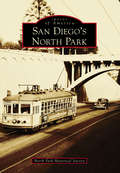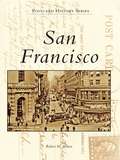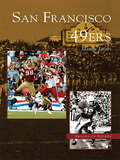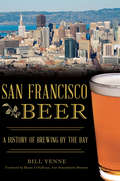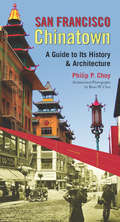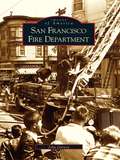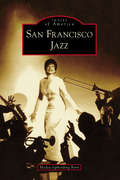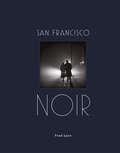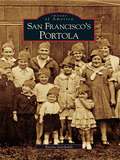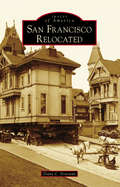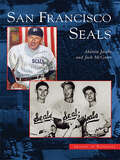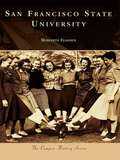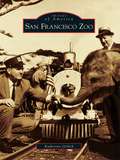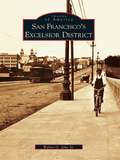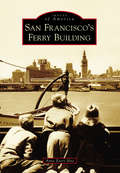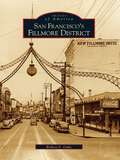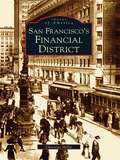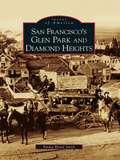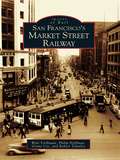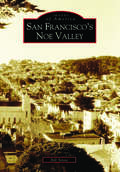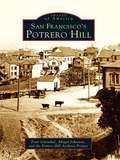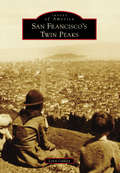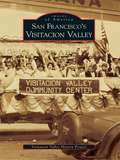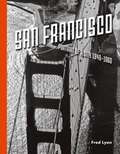- Table View
- List View
San Diego's North Island: 1911-1941 (Images of Aviation)
by San Diego Air and Space Museum Katrina Pescador Mark AldrichSan Diego's North Island is one of the most significant venues of aviation in the world. Starting in 1911, it was the home to one of the nation's first aviation schools, founded by Glenn Curtiss, who pioneered seaplane flight. He trained the nucleus of America's future air forces there, including Lt. Theodore Ellyson, the first naval aviator. When the United States entered World War I, the government took over the island with plans to build a training center for the nation's armed forces. The new army base was named Rockwell Field, and the navy portion was named Naval Air Station San Diego. By 1937, the army had moved out, and the navy became the sole tenant. Today NAS North Island is part of the largest aerospace-industrial complex in the navy and is headquarters for the Naval Air Force, U.S. Pacific Fleet.
San Diego's North Park
by North Park Historical SocietyHip and historic, North Park fascinates with its commercial energy and Craftsman charm. The community has always embodied an enterprising spirit. In the 1870s, cronies of Alonzo Horton mapped neighborhoods north of Balboa Park in a patchwork of individual subdivisions. Four decades later, John Spreckels's streetcars finally brought investors, residents, and shopkeepers, creating San Diego's slice of Bungalow Heaven. Baseball great Ted Williams played on North Park's fields, and tennis star Maureen Connolly trained on its courts. The local shops served as a regional commercial center after World War II, and the Toyland Parade attracted 300,000 spectators. Although decades of decline followed the exciting 1950s, North Park is flourishing again in a renaissance initiated by the restoration of the elegant North Park Theatre in 2005. This pictorial history tells the classic story of a boom, bust, and boom.
San Francisco
by Robert W. BowenThe golden age of postcards coincided with several momentous events in San Francisco history, including a major earthquake and fire destroying over one third of the city, rapid reconstruction, strikes, political upheaval, parades, festivals, and a world's fair. From World War I through World War II, jazz-age San Francisco experienced a building boom of houses, skyscrapers, and engineering marvels such as the Bay Bridge and Golden Gate Bridge, creating a marvelous Bay Area landscape documented on thousands of ubiquitous, inexpensive picture postcards popular with both visiting tourists and local residents.
San Francisco 49ers (Images of Sports)
by Martin JacobsFrankie Albert. Leo Nomellini. Bob St. Clair. Jimmy Johnson. Joe Montana. Jerry Rice. Bill Walsh. Steve Young. Ronnie Lott. Hugh McElhenny. Joe Perry. John Henry Johnson. Roger Craig. The legendary names roll off the tongue of every 49ers fan--never to be forgotten. Since 1946 when they were born into the All-American Football League, the 49ers have been pro football's most exciting and envied franchise. All of the cliffhangers and heartbreakers at grand old Kezar Stadium, and the blustering winds of Candlestick Park . . . where games were decided in the last seconds. The 49ers' unrivaled record includes 5 Super Bowl appearances and 5 victories, 17 NFC Western division titles, and an unbelievable 16 consecutive seasons with at least 10 regular-season wins. Eleven 49ers have been inducted into the NFL Hall of Fame. San Francisco 49ers is a must for every fan's library. Packed with over 200 rare archival photographs and stories and statistics, this collection is a detailed tribute to the 49ers' most memorable seasons, in all their undying glory.
San Francisco Beer: A History of Brewing by the Bay (American Palate)
by Bill Yenne Shaun O'SullivanThe story of beer in San Francisco is as old as the city itself. San Francisco had its first commercial brewery by 1847, two years before the gold rush, and went on to reign as the major brewing center in the American West through the nineteenth century. From the 1930s to the early 1950s, iconic San Francisco-based breweries Lucky and Acme owned the statewide California market. In the 1960s, Fritz Maytag transformed San Francisco's tiny and primitive Anchor Brewing into America's first craft brewery. Now, well into its fourth generation of craft breweries, San Francisco has seen more new breweries open in the second decade of the twenty-first century than were opened in the entire previous century, proving that tech is not San Francisco's only booming industry. Join local author and beer enthusiast Bill Yenne as he explores San Francisco's rich tapestry of beers and breweries that have made it a brewing capital in the West.
San Francisco Chinatown
by Philip P. ChoySan Francisco Chinatown is the first "insider's guide" to one of America's most celebrated ethnic enclaves by an author born and raised there. Both a history of America's oldest Chinese community and a guide to its significant sites and architecture, San Francisco Chinatown traces the development of the neighborhood from the city's earliest days to its post-quake transformation into an "oriental" tourist attraction as a pragmatic means of survival. Written by architect and Chinese American studies pioneer Philip P. Choy, and featuring photographs and walking tours, the book details the triumphs and tragedies of the Chinese American experience in the United States.
San Francisco Fire Department (Images of America)
by John GarveyIn San Francisco, history is as close as the sound of the fire engines and trucks racing by, sirens wailing. The San Francisco Fire Department took shape, as did the city, from the ashes and embers of the Great Fire of 1906. In the tumultuous seaport full of those seeking California's newly found gold, volunteer fire companies had to adapt to a teeming city full of canvas tents, wood shacks, kerosene lanterns, ocean breezes, and hilly winding streets. From a force that initially pulled hand-operated pumps and competed to be the first at a fire, traveling in horse-drawn equipment, the department has grown from a volunteer contingent of a few hundred to a company 1,800 strong and equipped to protect a city of 49 square miles, surrounded on three sides by salt water. The historic photographs of this volume document the establishment of the volunteer department on Christmas Eve 1849 and the inception of the paid force in 1866, as well as such colorful characters as Lily Hitchcock Coit, a belle who battled many a blaze with the volunteers and a portion of whose estate went to build the 210-foot Coit Tower on Telegraph Hill. Striking images, many never before published, illustrate how the fire department was affected not only by the well-known inferno of 1906 but by the six blazes that leveled the waterfront in the 1850s and a number of other fires throughout the city's history.
San Francisco Jazz
by Medea Isphording BernSan Francisco is probably best known for its hills, ubiquitous fog, dungeness crab and the Golden Gate Bridge. But jazz music's threads are similarly woven into the fabric of the city and its environs. Whether performed in renowned clubs like So Different, Jimbo's Bop City, Black Hawk, and the Jazz Workshop or in halls like the Primalon Ballroom and Great American Music Hall, jazz has infused the city from the Barbary Coast to the Fillmore, thrilling audiences for over a century. San Franciscans have grooved to and incubated scores of jazz acts, hot and cool, raucous and contemplative. That tradition continues today.
San Francisco Noir
by Fred LyonFollowing in the footsteps of classic films like The Maltese Falcon and The Lady from Shanghai, veteran photographer Fred Lyon creates images of San Francisco in high contrast with a sense of mystery. In this latest offering from the photographer of San Francisco: Portrait of a City 1940–1960, Lyon presents a darker tone, exploring the hidden corners of his native city. Images taken in the foggy night are illuminated only by neon signs, classic car headlights, apartment windows, or streetlights. Sharply dressed couples stroll out for evening shows, drivers travel down steep hills, and sailors work through the night at the old Fisherman's Wharf. Stylistically, many of the photographs are experimental the noir tone is enhanced by double exposures, elements of collage, and blurred motion. These strikingly evocative duotone images expose a view of San Francisco as only Fred Lyon could capture.
San Francisco Portola
by Rayna GaribaldiThe Portola has a long and unique history dating back to the late 1800s. Too often misidentified with neighboring districts, it has its own story to reveal. Originally settled by Jewish immigrants, the area evolved into a community populated by nurserymen and their families who grew much of the city's flowers. "The Road," as San Bruno Avenue was affectionately referred to by the locals, hosted businesses that included bakeries, grocery stores, pharmacies, and a theatre. In recent years, the Portola has undergone changes as community leaders have enacted programs to beautify the neighborhood and attract new businesses and families to this locale.
San Francisco Relocated
by Diane C. DonovanSan Francisco's colorful history has been explored so extensively that it is surprising to note that its moved buildings remain one of the city's best-kept secrets. Reports are widely scattered in newspapers and architectural references; yet, despite the fact that the city's relocations are second only to Chicago's, there are no books in print concerning this curious history--until now. And it is a long, lively tale indeed. Beginning in 1850 and continuing today, it involves hundreds of moved structures, from houses and apartment buildings to churches and schools. Buildings were relocated for many reasons, from street modifications in the early 1900s to the advent of freeways and Bay Area Rapid Transit (BART) in the 1950s and 1960s. Buildings were cut in half and moved in pieces, disassembled and moved brick by brick, or (more commonly) moved intact--some as heavy as 9,000 tons or as long as 110 feet. Buildings moved to San Francisco via ship around Cape Horn, traveled across town using horses and wagons or (later) trucks, and were barged over the Bay.
San Francisco Seals (Images of Baseball)
by Martin Jacobs Jack McguireFor more than half a century, San Francisco Seals baseball was a fertile source of future major league players, with a legacy firmly grounded in the annals of Pacific Coast League baseball. Paul and Lloyd Waner, Ping Bodie, Earl Averill, William Kamm, Ferris Fain, Harry Heilmann, Smead Jolley, "Lefty" O'Doul, Frankie Crosetti, the DiMaggio brothers (Joe, Vince, and Dom), Larry Jansen, and others all launched their careers as Seals. From 1903 to 1957, the Seals were the toast of the town, offering tight pennant races and intense games with the Oakland Oaks--their cross-bay rivals--while playing at Recreation Park and Seals Stadium. In almost 6 decades, the Seals won 11 pennants and 4 Governor's Cups. They survived the earthquake and fire of 1906, the Great Depression, and two world wars. Never forgotten will be Smead Jolley, who in 1928 had what many consider the best all-around season in PCL history by hitting .404 and winning the Triple Crown; Gus Suhr's record-breaking 51 homeruns in 1929; Joe DiMaggio's 61-game hitting streak during his 1933 rookie season; and pitcher Bob Joyce's 31 victories and 35 complete games in 1945.
San Francisco State University
by Meredith EliassenSan Francisco State University has promoted educational excellence for more than a century. Established as a vocational school for teachers, it became the first such institute in the United States to require a high school diploma. As the school expanded its curriculum, it became San Francisco State Teachers College (1921), San Francisco State College (1935), and San Francisco State University (1972). Known as "the City's University," San Francisco State is situated on a park-like campus in the southwest corner of San Francisco. The school's motto--"experience teaches"--communicates its pragmatic approach to education, and SFSU has developed many internationally respected programs over the years. The school's fascinating history includes complete destruction by the 1906 San Francisco earthquake and fire, as well as a five-month student/faculty strike during the late 1960s, which resulted in the founding of the first School of Ethnic Studies (1969) in the United States.
San Francisco Zoo
by Katherine GirlichIn 1922, philanthropist and president of the San Francisco Parks Commission, Herbert Fleishhacker, purchased a 60-acre site in southwestern San Francisco. Fleishhacker Pool was built in 1925 and an adjoining zoo added in 1929. Originally called Fleishhacker Zoo, it featured a variety of exotic wildlife. Major exhibits were built in the 1930s Depression era as part of the Work Progress Administration (WPA). This book celebrates the San Francisco Zoo's 80-year history as it revisits cherished animals and structures like Monkey Island, Storyland, and Dentzel Carousel. The zoo holds a special place in the hearts of many, as it is a great San Francisco treasure along the foggy shores of Ocean Beach.
San Francisco's Excelsior District
by Walter G. Jebe Sr.The Excelsior District traditionally has not been among San Francisco's "spotlight" neighborhoods, yet this area is an important residential and commercial zone that is home to some 30,000 residents. These rolling hills south of San Francisco's better-known districts are now covered with row upon row of houses, streets, and apartments. But places like the Excelsior were once sparsely populated, agrarian, and even rural. This volume of vintage photographs chronicles the Excelsior's intriguing journey from rugged swamp and farmland to the busy cosmopolitan neighborhood we know today. It is a tale of determined immigrant families putting down roots in a challenging locale and overcoming adversity to stake out a permanent enclave in this famed city. It is also a story of large-scale construction and reclamation to tame the rugged outskirts of San Francisco.
San Francisco's Ferry Building
by Anne Evers HitzFor many years, visitors traveling to San Francisco came via ferry, and the Ferry Building, one of San Francisco’s most famous landmarks, stood ready to welcome them. In the 1920s, the Ferry Building was the world’s second-busiest transit terminal (after Charing Cross, London), with more than 50,000 people a day passing through the elegant structure, designed by architect A. Page Brown and opened in 1898. When the 1906 earthquake struck and the ensuing fire was destroying the city, the venerable waterfront icon stood above the ruins, giving residents hope that the city would recover and rise from the ashes. By 1939, with the Golden Gate Bridge and the Bay Bridge both open, ferry traffic fell off. By the late 1950s, ferry service ended altogether, and the building’s beautiful facade was blocked by the double-decker Embarcadero Freeway. With the freeway’s demise after the 1989 Loma Prieta earthquake, the Ferry Building was restored and reopened in 2003. It is once again a beacon of civic pride, a landmark listed in the National Register of Historic Places, and a public space that anchors the San Francisco waterfront.
San Francisco's Fillmore District
by Robert F. OaksToday's Fillmore District, while one of San Francisco's most diverse neighborhoods, bears little resemblance to the cosmopolitan place it once was. This district, which has arguably changed more than any other in the city, once held a large Jewish settlement, replete with synagogues, bakeries, and kosher markets. It also had a huge Japanese community, now centered in Japantown but not as extensive as in the prewar years; amusements like the Chutes, Dreamland boxing ring, and theatres; schools, churches, and a celebrated "Jazz District" that hosted the top names in music for many years. And in one of the most controversial displays of civic power, this densely populated area fell to the forces of redevelopment, bisected by the ambitious plan to widen Geary Boulevard, creating a freeway-like road through the district and forcing out thousands of dwellers whose homes were either moved or demolished.
San Francisco's Financial District
by Christine MillerSome call it "Wall Street West," while some just call it "downtown," but San Francisco's financial district is a long-running business powerhouse, home to scores of corporate headquarters, prominent law firms, restaurants, hotels, banks, the Pacific Stock Exchange, and striking waterfront views radiating outward from the landmark 1898 Ferry Building. The district was among the first areas to be settled,and many of the original 19th-century buildings still stand, along with streets and businesses named for early California business leaders like Mills, Sharon, Fair, and Flood. The district holds examples of nearly every type of commercial architecture and is arguably the city's most popular, as its population swells by tens of thousands of office workers each day.
San Francisco's Glen Park and Diamond Heights (Images of America)
by Emma Bland SmithHemmed in by steep hills, Glen Park is defined by its quintessentially San Franciscan topography. Only 120 years ago this area, as well as neighboring Diamond Heights, was part of the "Outside Lands," soisolated that only farmers would settle here. Life revolved around Islais Creek, which ran through the canyon and provided water for the dairies. Then, in 1892, a German immigrant named Behrend Joost founded the city's first electric streetcar to shuttle residents to jobs downtown, and a neighborhood was born. As peak-roofed wooden cottages and houses began to fill in the valleys, the urban, homey, and decidedly livable Glen Park that we know today began to emerge.
San Francisco's Market Street Railway
by Grant Ute Robert Townley Philip Hoffman Walt VielbaumThe Market Street Railway Company thrived in an age when rails ruled San Francisco. Spanning the Roaring Twenties, the Great Depression, and the boom times of World War II, it had a long and legendary lifetime that is deeply ingrained in the city's early identity. Gradually, however, it became challenged by the emergence of the automobile, cheaper motor coaches, and "nickel jitneys"--competing cars on the same routes. The MSRy painted the fronts of its cars white to show up well in San Francisco's misty weather, and for many years people called them "the White Front cars." Franchise competition and city regulations undid MSRy, and its assets were absorbed into MUNI in 1944. However, the name lives on as the nonprofit Market Street Railway organization, dedicated to preserving the history of this company and also to retrofitting early streetcars from across the globe, putting them back in service on Market Street.
San Francisco's Noe Valley
by Bill YenneNamed for Jose de Jesus Noe, San Francisco's last Mexican mayor, Noe Valley is undoubtedly one of San Francisco's favorite neighborhoods and certainly one of the most picturesque. Yet the area has a rich and varied history reaching far beyond the lovely buildings and lively street scenes familiar to so many citydwellers. Originally part of the Rancho de San Miguel land grant, the area was incorporated into the city and became an early example of a San Francisco enclave situated away from the noise and bustle of the downtown and waterfront areas. Noe Valley gradually became an important residential and business center known for its beautifully restored Victorian homes, as well as for the vibrant commercial corridor on Twenty-fourth Street.
San Francisco's Potrero Hill
by Potrero Hill Archives Project Peter Linenthal Abigail JohnstonIn the early 1800s, it was called the Potrero Nuevo, or "new pasture." Gold-rush squatterssoon put the squeeze on Mission Dolores's grazing cattle, and when the fog lifted, Potrero Hill became the first industrial zone in San Francisco, with iron-smelting plants, butcheries, and shipbuilding dominating the waterfront during the late 19th century. The Hill has been home to immigrants from Scotland, Ireland, China, Russia, Mexico, and from everywhere in between. These days, many of the factories and warehouses have been converted into housing and offices for techies. And for the record, the crookedest street in San Francisco is not Lombard--it's Vermont, between 20th and 22nd.
San Francisco's Twin Peaks
by Lynn OakleyTwin Peaks is located in the geographic center of San Francisco. These distinctive hills are not only recognizable landmarks with spectacular views, they also play a major role in the safety and security of San Franciscans. Towers on Christmas Tree Point provide communication support to the police and fire departments. Firmly constructed into the bedrock of Twin Peaks are three massive municipal reservoirs that supply gravity-pulled drinking water and water for fire fighting. Roads and a tunnel were built on, around, and through the peaks with the purpose of gaining easier access to the western parts of the city. Farms and homes appeared along Corbett Road, and new neighborhoods sprang up on the slopes of Twin Peaks: Midtown Terrace, the Crown, Graystone, Villa Terraces, and Clarendon Heights, on which stands the Sutro Tower.
San Francisco's Visitacion Valley
by Visitacion Valley History ProjectRancho Ca±ada de Guadalupe, La Visitacion y Rodeo Viejo was named in July 1777 by a party of Spanish priests and soldiers who lost their way in heavy fog while en route to the Presidio. Now called Visitacion Valley, this area was the only Mexican land grant within San Francisco deeded to an Anglo. Windmills pumped water to irrigate the fields of early settlers' cattle farms, nurseries, and vegetable gardens, leading to the nickname "Valley of the Windmills." Over the years, however, the pastoral scenery gave way to a mix of housing and commerce, and today Visitacion Valley is one of the city's most ethnically diverse neighborhoods.
San Francisco, Portrait of a City: 1940-1960
by Fred LyonWith a landmark around every corner and a picture perfect view atop every hill, San Francisco might be the world's most picturesque city. And yet, the Golden City is so much more than postcard vistas. It's a town alive with history, culture, and a palpable sense of grandeur best captured by a man known as San Francisco's Brassai. Walking the city's foggy streets, the fourth-generation San Franciscan captures the local's view in dramatic black-and-white photos-- from fog-drenched mornings in North Beach and cable cars on Market Street to moody night shots of Coit Tower and the twists and turns of Lombard Street. In San Francisco, Portrait of a City 1940-1960, Fred Lyon captures the iconic landscapes and one-of-a-kind personalities that transformed the city by the bay into a legend. Lyon's anecdotes and personal remembrances, including sly portraits of San Francisco characters such as writer Herb Caen, painters Richard Diebenkorn and Jean Varda, and madame and former mayor of Sausalito Sally Stanford add an artist's first-hand view to this portrait of a classic American city.

